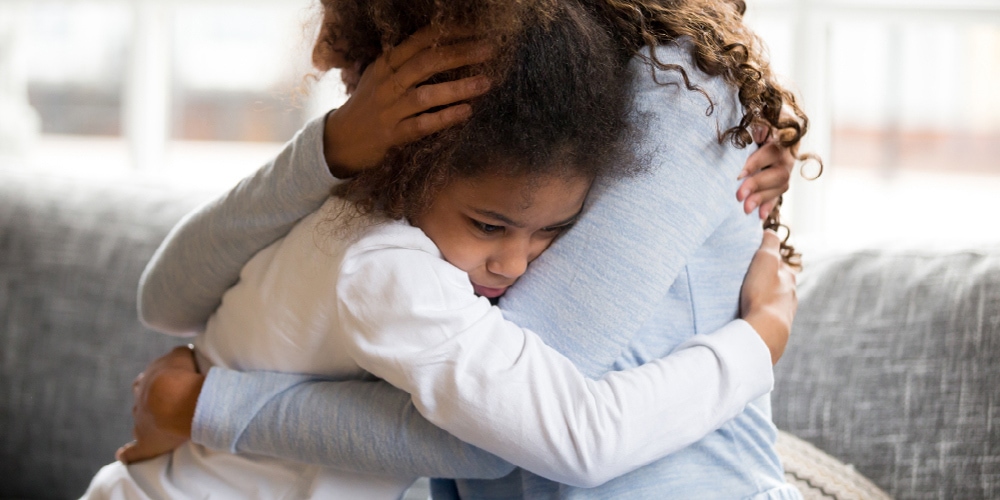How Do I Talk to My Kids About THIS?

The news is all around us. It’s devastating. Lives are being lost in mass shootings all across the country – in churches, in markets, in restaurants, out on the streets and in elementary schools. There have been over 200 mass shootings in the U.S. in 2022 alone, and nearly 30 of those have taken place inside of schools.* As parents, caregivers and ministry workers, we know we need to disciple our kids and families through this … but how? What do we say when there are no words?
Cultivate a safe space for processing.
No matter the age, kids need to process their thoughts and feelings. Start by asking questions to seek understanding about their knowledge of current events so you can gain a baseline of where they are at.
- Kids who are preschool-aged and younger may not have an awareness of the situation, nor do they need to. However, they are in tune and affected by the sadness of those around them. This conversation may sound like, “Did you notice that mommy was sad today? I heard some news that made me feel sad. Do you ever feel sad? It’s normal to feel all kinds of things: happy, sad, mad, excited, worried. We can talk to each other about our feelings. Do you have any feelings you want to talk about?”
- Elementary-aged kids may struggle with feelings of worry, anxiety, insecurity and clinginess. They may not articulate their feelings, but often their feelings come out through their behaviors. Teens may also struggle with feelings of worry and anxiety, and may question their faith. It’s tempting to want to be quick with answers — cultivating a safe space means asking questions that encourage kids to share what they are thinking.
- Ask open-ended questions to allow kids to lead the conversation. As they share with you, listen and validate their thoughts and feelings. Validate doesn’t always mean agree. It may sound like, “I can understand why you would think that,” or “that makes sense you would feel that way,” or “I know you’re worried, and that’s okay. I’m going to help you get through this.” It may help to role-play or talk through what would happen if a child’s fear or worry were to come true, so they can further process in a safe space.
Give honest answers.
When kids ask questions, especially tough questions, we may feel like we need to have it all together or have a perfectly constructed response. The truth is, kids don’t need perfect answers. They want and need our honest answers. Give concise, honest answers at an age-appropriate level. Sometimes this may sound like, “I don’t know,” or “I wonder about that, too.”
A guide for some difficult questions.
Here are some questions kids may ask, and a guide for how to answer them. Use this guide at your discretion, as you know your child best.
- Could this happen at my school/church/city?
- It would be easiest to assure kids that things like this would never affect them. However, we live in a broken world, and there’s no way to keep that promise. Instead, assure kids it is unlikely to happen, but also talk through the “what-ifs” at an age-appropriate level. Most of all remind them God is with them in every single situation.
- Why do people hurt other people?
- Ever since Adam and Eve sinned, we have lived in a world where sin affects everything. Sin causes separation between us and God. Sin changes the way we think, the words we speak, and even the things we do. Because of sin, we see anger, hurt, sadness, and evil around us. Sin causes broken relationships, sickness, suffering, and even death.
- Why does God allow bad things to happen?
- Trials and tribulations can make kids feel like God has rejected or forgotten about them. Some situations are simply beyond our comprehension, but it’s important to emphasize that God isn’t the one who is causing these bad things to happen. God allows people to have free will—which means we can make our own choices. The Bible is clear that God cares about the hard things that are happening in the world and He grieves when sinful acts take place (Isaiah 63:10).
- How am I supposed to react to this news?
- There isn’t a “right” or “wrong” way to react, think, or feel. Sometimes all we can do is sit in our grief and sadness together. And that’s perfectly okay.
Point to Jesus.
When things happen that remind us of the broken world we are living in, it’s easy to feel hopeless. But, as followers of Jesus, we know we have hope and that we are not alone.
Jesus brought about restoration (making broken things right) when He defeated death. Even though God’s world was being made right again, He’s not done yet. We experience the new love and hope God has given us as followers of Jesus. We also see a world that still has brokenness God has not yet made right, but we know He will. Remind kids about this truth. Take time to pray together and talk to God about the hard things. Take out your Bible and read through Scripture that reminds us of God’s presence, His peace, His justice and His mercy. (The book of Psalms or John 14 are great places to start.)
Seek Help If Needed.
If you have concerns about the mental health of a child, seek help. Consult with a pastor, counselor or mental health professional.
For further guideance, listen to: “The Sunday After a Tragedy: Livestream Conversation With Dr. Shelly Melia”
https://www.facebook.com/AwanaHQ/videos/1317360498787014
* https://www.npr.org/2022/05/24/1101050970/2022-school-shootings-so-far
